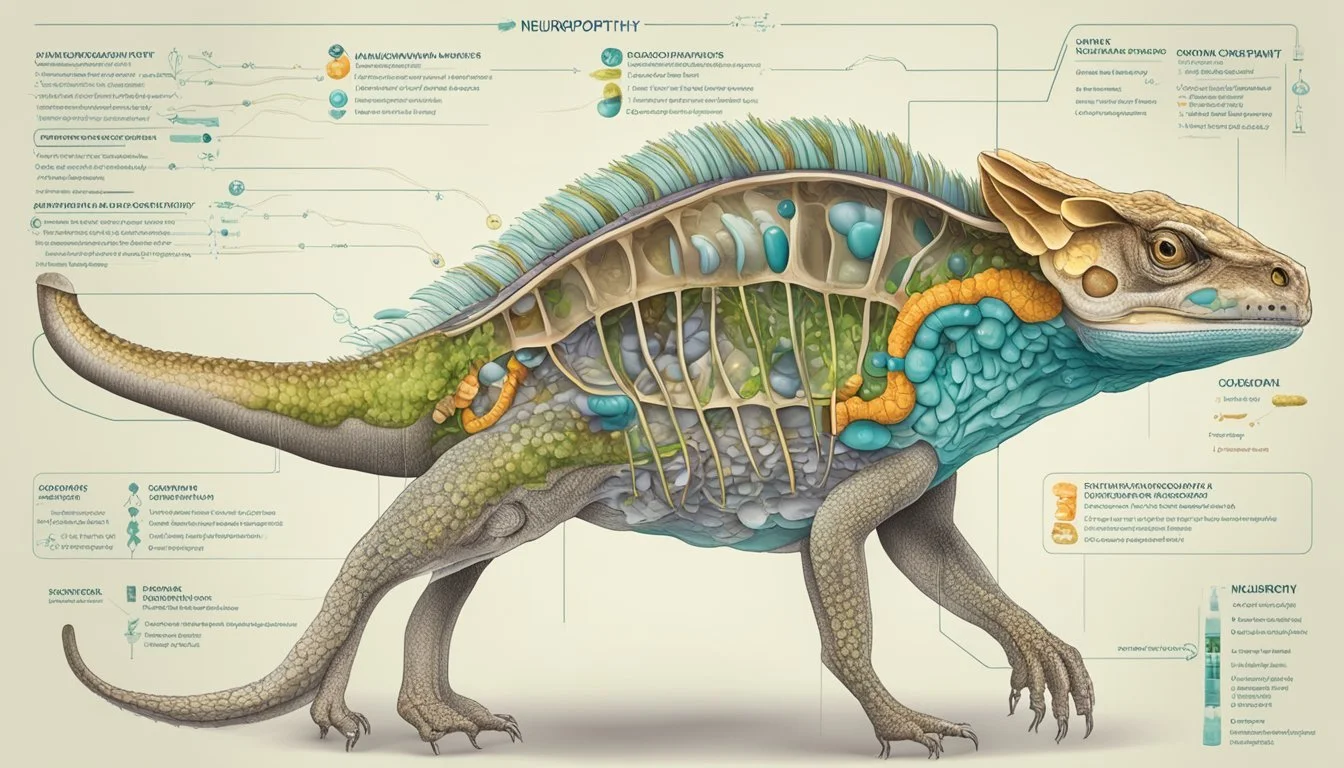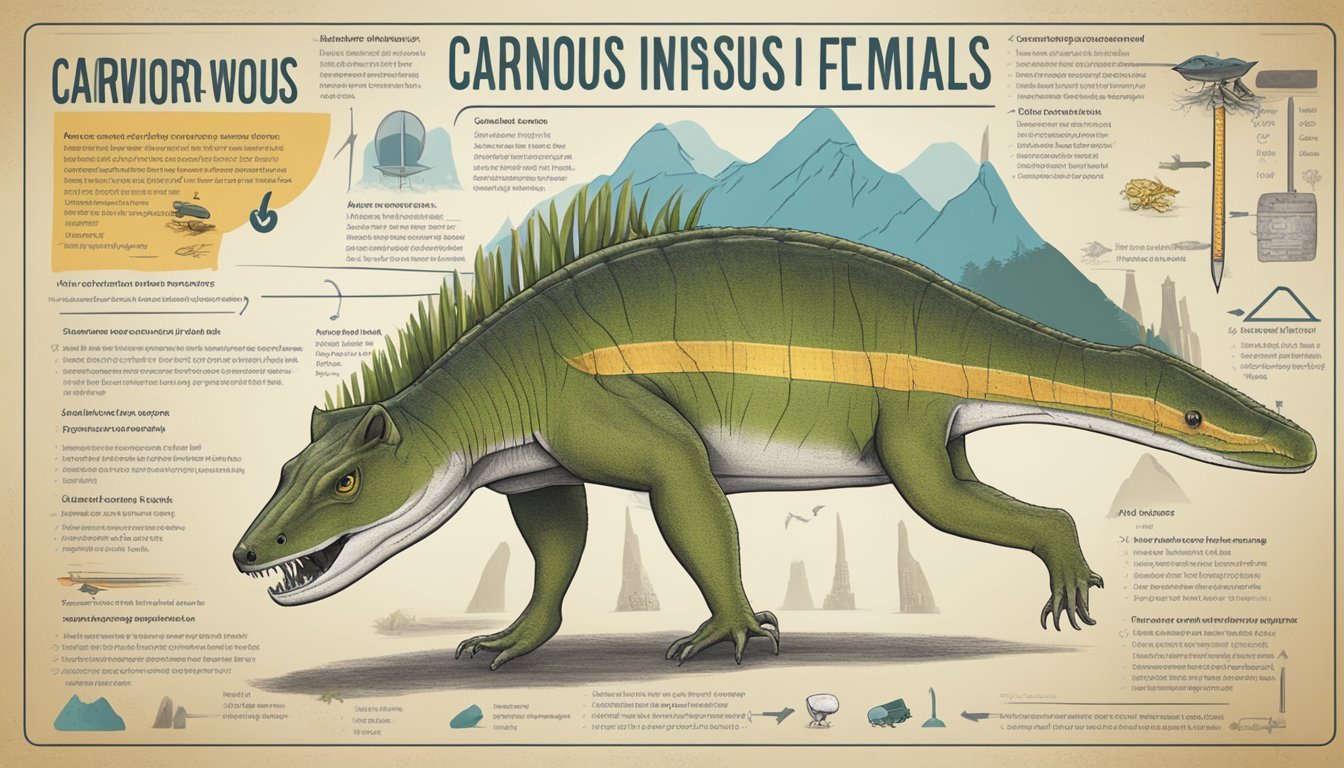Carnivore Diet and Neuropathy
Exploring Neuroprotective Advantages
Neuropathy is a medical condition characterized by damage or dysfunction of one or more nerves, resulting in numbness, tingling, muscle weakness, and pain in the affected area. Traditional treatment options for neuropathy often involve medications, physical therapy, and lifestyle changes to manage symptoms. In recent times, dietary approaches have also been explored as a means to potentially alleviate the discomfort associated with neuropathy.
The carnivore diet, which consists solely of animal products, is one such dietary intervention that is gathering attention for its potential benefits in individuals suffering from various forms of neuropathy, particularly diabetic neuropathy. Proponents suggest that the diet's restrictive nature leads to reduced inflammation—a key factor in the development and progression of neuropathic pain.
Moreover, the high-fat, low-carbohydrate profile of the carnivore diet may stabilize blood sugar levels, which can be particularly beneficial for those with diabetic neuropathy. Clinical studies on the diet's efficacy for neuropathy are limited, but anecdotal evidence and preliminary research indicate that some individuals may experience symptomatic relief from following this dietary regimen. As with any diet, it's crucial to consult with healthcare professionals before making significant changes, especially for those with chronic health conditions.
Understanding the Carnivore Diet
This section examines the carnivore diet, detailing its definition, historical background, fundamental principles, food composition, and contrasts with other dietary approaches.
Defining the Carnivore Diet
The carnivore diet strictly consists of animal products. Adherents consume primarily meats, including organ meats, fish, eggs, and in some variations, dairy. This diet excludes fruits, vegetables, grains, legumes, seeds, nuts, and all other plant-based foods, focusing entirely on high-protein and fat intake with minimal to no carbohydrates.
History and Popularity
Originating from the belief in reverting to ancestral dietary patterns, the carnivore diet mirrors the eating habits thought to be prevalent during Paleolithic times. It has gained significant attention and popularity as a counter to the modern high-carbohydrate, processed diet, largely through social media and the advocacy of health enthusiasts.
Core Principles and Foods Included
Animal Products: Encompasses all forms of meat, such as beef, pork, and chicken, as well as fish, lamb, and game.
Organ Meats: Highly encouraged for their nutrient density.
Eggs and Dairy: Included by some for their protein and fat content.
Zero Carbohydrate: Does not incorporate any carbohydrate-rich foods, eschewing even dairy forms that contain sugars like lactose.
Comparison to Other Diets
Unlike vegetarian and vegan diets that exclude meat and other animal-derived products, the carnivore diet sits at the opposite end of the dietary spectrum. It differs from the ketogenic diet by not counting macros but similarly minimizes carbs. It also contrasts with the Mediterranean diet, which includes a balanced intake of produce, grains, and lean proteins.
Nutritional Profile of the Carnivore Diet
The carnivore diet prioritizes the intake of animal products and is distinctive for its exclusion of plant-based foods. This section examines its macronutrient composition and assesses the availability and risks associated with the diet's vitamin and mineral content.
Protein and Fat Content
The carnivore diet is rich in protein and fat, primarily sourced from various meats such as beef, poultry, and fish. These meats provide essential amino acids necessary for bodily functions. On this diet, individuals typically consume a high proportion of saturated fats, along with some monounsaturated and polyunsaturated fats including omega-3 fatty acids, particularly from fish.
Vitamin and Mineral Intake
Animal products on the carnivore diet are substantial sources of certain vitamins and minerals.
Vitamin D and B vitamins are abundant, particularly in organ meats and eggs.
Vitamin A is found in liver and other organ meats.
Red meat is a good source of iron, zinc, and selenium.
However, it is notable that the only source of vitamin C in this diet comes from organ meats, as traditional sources like fruits and vegetables are omitted.
Risk of Nutrient Deficiencies
Despite the high intake of some nutrients, the carnivore diet raises concerns about the risk of nutrient deficiencies due to the exclusion of plant-based foods. Those following the diet may be at risk for deficiencies in:
Fiber, which is absent in this diet, is essential for digestive health.
Vitamin C, which can become deficient if organ meat consumption is low, as it is the sole animal-based source.
Calcium, which is typically found in dairy products, a food group that some individuals on the carnivore diet may restrict or avoid.
Dieters may also fall short on antioxidants and plant-specific nutrients, and long-term adherence could result in gaps in essential nutrients.
Potential Benefits for Neuropathy
In exploring the carnivore diet's role concerning neuropathy, individuals may observe various potential benefits. These can include an impact on nerve health, blood sugar control in the context of diabetes, a reduction in inflammation, and weight management's contribution to nerve function.
Impact on Nerve Health
The carnivore diet, consisting mainly of animal-based foods, is posited to influence nerve health positively. Nerves might benefit from the high content of certain nutrients like B12 and omega-3 fatty acids found in meat, which are essential for maintaining nerve integrity and function.
Blood Sugar Control and Diabetes
One of the primary complications of diabetes is neuropathy, a result of consistently high blood sugar levels. A carnivore diet may assist in stabilizing blood sugar, potentially reducing the risk or progression of diabetic neuropathy. Adequate blood sugar control is crucial for preventing damage to the delicate nerve tissues.
Reduction in Inflammation
Chronic inflammation is a known factor in the development and exacerbation of neuropathic pain. The carnivore diet may lead to a reduction in inflammation markers, thereby potentially alleviating neuropathic symptoms and improving quality of life for those affected by nerve pain.
Weight Management for Nerve Function
Excess body weight can increase pressure on nerves, contributing to neuropathy. Following a carnivore diet may facilitate weight loss and help manage body weight, which, in turn, can reduce the mechanical stress on nerves and support overall nerve function.
Examining the Scientific Evidence
This section explores the current scientific understanding surrounding the carnivore diet and its potential impact on neuropathy through various studies, clinical trials, and professional perspectives in the healthcare community.
Research on the Carnivore Diet and Neuropathy
Recent research probes the nutritional adequacy of diets devoid of plant-based foods and their effect on health conditions such as neuropathy. One case in point is Dr. Shawn Baker, an orthopedic surgeon who advocates for the carnivore diet and has been closely monitored by the New Mexico Medical Board. His experience suggests potential benefits, yet it underscores the need for robust data.
Research Findings
Some individuals with neuropathy report symptom alleviation.
Plant-free diets may influence neuropathy, but evidence is not conclusive.
Case Studies and Clinical Trials
Case studies and preliminary clinical trials have begun to shed light on the carnivore diet's impact. These studies vary in their design:
Small sample sizes may limit the generalizability of results.
Observational data indicates mixed outcomes on cardiovascular disease risk factors, which can be related to diabetic neuropathy.
Clinical Trials
In Progress: Trials examining long-term effects.
Results: Awaiting publication for peer review.
Professional Opinion and Testimonials
Healthcare professionals often have differing views on the carnivore diet's effect on neuropathy, given the absence of extensive research. Testimonials from individuals on the carnivore diet reveal high satisfaction and reported health benefits, but these anecdotes require scientific substantiation.
Professional Stance
Endocrinologists: Cautious optimism with a call for more research.
Nutritionists: Concerns about long-term nutrient deficiencies.
In summation, while there are anecdotal reports and some emerging scientific evidence suggesting that a carnivore diet could potentially benefit those with neuropathy, the current scientific consensus is yet to be established. There's a need for more extensive, controlled clinical trials to provide definitive evidence on this subject.
Potential Risks and Side Effects
Exploring the carnivore diet entails understanding the possible risks and side effects. Individuals considering this dietary shift must be aware of the nutritional and long-term health implications, as well as ways to manage any adverse effects that may arise.
Nutritional Balance Concerns
The carnivore diet, which consists mainly of animal products, poses risks related to nutritional balance. Nutrient deficiencies may develop due to the lack of fruits, vegetables, and whole grains, which are traditional sources of essential vitamins, minerals, and dietary fiber. For instance:
Fiber Deficiency: May lead to digestive issues like constipation.
Vitamin Deficiencies: Vitamin C and some B vitamins, typically found in plant-based foods, may be lacking.
Mineral Deficiencies: A shortage in minerals such as magnesium and potassium can occur.
A diet lacking in nutrient-dense plant foods may not provide a balanced intake, leading to potential deficiencies and health concerns.
Long-Term Health Implications
Committing to a carnivorous dietary pattern over the long term can have implications for one's health. There are potential risks of chronic diseases such as:
Heart Disease: High intake of saturated fats from animal foods may increase the risk.
Colon Cancer: Diets that are heavy in red and processed meats have been linked to colon cancer.
Arthritis: Some studies suggest that high meat consumption might exacerbate certain types of arthritis.
The scarce research on the long-term adherence to the carnivore diet calls for cautious consideration of these potential risks.
Managing Side Effects
Individuals on a carnivore diet may experience certain side effects related to digestion and metabolism. It is crucial to monitor for any adverse reactions and address them:
Digestion: Transitioning to a high-fat, protein-heavy diet might require the digestive system to adjust. Bile production and digestive enzymes must increase to handle the greater fat intake.
Constipation: The absence of dietary fiber can lead to constipation. It may be manageable by ensuring adequate hydration and adding fiber supplements if deemed necessary by a healthcare professional.
Careful management is required to mitigate side effects and to strive for a healthful eating approach within the parameters of the carnivore diet.
Dietary Implementation Strategies
Implementing the carnivore diet as a potential intervention for neuropathy requires careful planning and adaptation. The following strategies provide a structured approach for those considering this diet to manage neuropathy symptoms.
Starting the Carnivore Diet
To begin the carnivore diet, one should transition to animal-based foods such as meat, fish, eggs, and dairy. It's crucial to remove all plant-based foods and minimize carbohydrate intake to enter ketosis, a state where the body burns fat for fuel. Starting steps include:
Inventory current food items and replace them with carnivore-approved options.
Plan meals focused on a variety of animal products to ensure nutrient sufficiency.
Maintaining a Balanced Approach
While predominantly consuming animal products, importance must lie in maintaining nutritional balance. Critical points include:
Choosing a range of meat cuts for a variety of nutrients and fatty acids.
Including organ meats to acquire vitamins typically found in dietary fiber and plants.
Without plant-based dietary fiber, individuals must monitor their digestive response and adjust fat-to-protein ratios to maintain gut health.
Transitioning from Other Diets
Shifting from a ketogenic diet or an elimination diet to the carnivore diet might be less drastic due to similarities in low carb principles. Key considerations for a smooth transition include:
Gradually increasing the intake of animal products while phasing out remaining plant foods.
Monitoring the body's response to dietary changes to assess the alleviation or exacerbation of neuropathy symptoms.
Careful observation during the transition can help in identifying foods that contribute to symptom improvement.
Personal Experiences and Community Perspectives
Personal narratives and the collective voice of community members provide real-world insights into the carnivore diet's impact on neuropathy. These experiences are valuable for understanding the diet's practical application and its perceived benefits and shortcomings.
Success Stories from Followers
Individuals following the carnivore diet often share their success stories, attributing improvements in neuropathy symptoms to the diet. Advocates, including Shawn Baker, an orthopedic surgeon, promote the diet as a potential intervention for various health conditions. They cite personal experiences of pain reduction and enhanced nerve function. These narratives typically emerge in online forums and social media platforms where followers celebrate their perceived health transformations.
Criticism and Skepticism
Despite the positive anecdotes, the carnivore diet faces criticism and skepticism from parts of the medical community and the public. Critics point out the lack of large-scale, peer-reviewed clinical studies to substantiate claims of the diet's effectiveness against neuropathy. They also caution against potential nutritional deficiencies and long-term health consequences of such a restrictive diet.
Role of Community in Diet Adherence
Community support plays a crucial role in the adherence to the carnivore diet. Enthusiasts often form groups to guide and motivate each other through the dietary transition. This community aspect provides a source of shared experiences, recipes, and coping strategies for dealing with neuropathy. It reinforces individual commitments to the diet and acts as a knowledge base for newcomers seeking to understand the implications for nerve health.
Addressing Common Concerns
When considering a carnivore diet for neuropathy, several apprehensions may arise, particularly regarding the exclusion of certain food groups, potential digestive issues during adaptation, and how this diet may interact with existing medications and health conditions.
Fear of Excluding Certain Food Groups
The exclusion of all plant-based foods can lead to concerns about nutritional deficiencies. Animal-based foods, however, can provide vital nutrients like vitamin B12, amino acids, and omega-3 fatty acids, which are essential for nerve health. It is still important to consider the balance and variety within the animal-based food groups to ensure that one's dietary needs are met without processed foods that may lead to other health issues.
Digestive Issues and Adaptation
A shift to a carnivore diet can result in digestive issues such as gas and constipation, as the body adapts to a higher intake of protein and fat. These symptoms may be temporary as the digestive system adjusts. It is crucial to monitor these changes and adapt food choices within the diet to alleviate symptoms, which may include incorporating different cooking methods or including a variety of animal-based food sources.
Interaction with Medications and Conditions
Transitioning to a carnivore diet may influence the effectiveness of certain medications and can impact underlying health conditions. Those on medication for chronic conditions should consult healthcare providers to understand the potential interactions. For example, a high intake of vitamin K-rich foods like liver can affect blood-thinning medications. Regular monitoring and adjustments by a healthcare professional may be necessary to ensure medication efficacy and overall health safety.
Additional Considerations
When integrating a carnivore diet for neuropathy relief, one should be mindful of potential impacts beyond personal health, such as the influence of cooking methods, environmental considerations, and the procurement of high-quality meats.
Influence of Cooking Methods
The way in which one cooks their meats can affect the nutrient composition and potential health benefits. For instance, grilling or broiling meats at high temperatures may create compounds that could be detrimental to nerve health. Conversely, methods like steaming or slow-cooking may preserve the integrity of nutrients beneficial for neuropathy management.
When it comes to getting the best deals, buying a slow cooker online is the way to go!
Environmental and Ethical Concerns
A diet heavy in animal products, particularly beef and lamb, has a profound environmental impact, with significant carbon and methane emissions. Ethical considerations also come into play regarding the treatment of animals in the production of meat, eggs, and dairy. Consumers may seek out certified humane or grass-fed options to align with these concerns.
Availability of High-Quality Meats
Access to quality meats is crucial for a carnivore diet aimed at addressing neuropathy. The inclusion of organic and pasture-raised selections of chicken, pork, beef, and seafood promises lower exposure to antibiotics and hormones. The consumption of wild-caught seafood and selection of organic dairy products like cheese, butter, and milk also contribute to the intake of high-quality fats and proteins.
Conclusion: Balanced Viewpoint on the Carnivore Diet and Neuropathy
Advocates suggest that the carnivore diet, which is rich in animal-based foods, may have potential benefits for individuals with neuropathy, particularly diabetic neuropathy. Research indicates that managing blood sugar levels can be crucial in preventing and controlling neuropathy, and the carnivore diet's low carbohydrate content could conceivably support this objective.
However, it is essential to acknowledge that scientific evidence is, as of now, limited. While personal accounts and preliminary studies hint at positive outcomes, comprehensive research is needed to substantiate these claims and understand the long-term impacts. The diet's restriction of plant-based foods may also lead to nutritional deficiencies if not carefully managed.
It is recommended that individuals considering the carnivore diet for neuropathy consult healthcare professionals. They can evaluate whether this diet aligns with their health status and nutritional needs, and provide guidance on preventive measures to avoid potential adverse effects.
In summary, while the carnivore diet may hold promise for some individuals with neuropathy, the approach should be one of cautious optimism. Embracing a wider context of medical advice, monitoring health indicators, and acknowledging the individuality of dietary responses is vital. Personal testimonials provide hope, yet empirical validation remains paramount to endorse dietary changes for neuropathic conditions.








